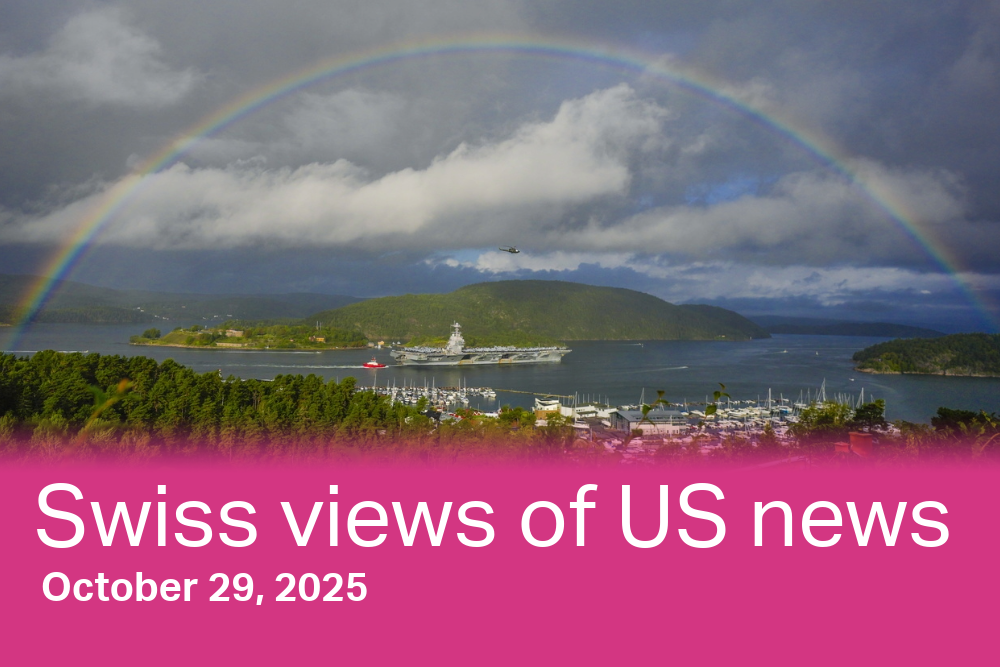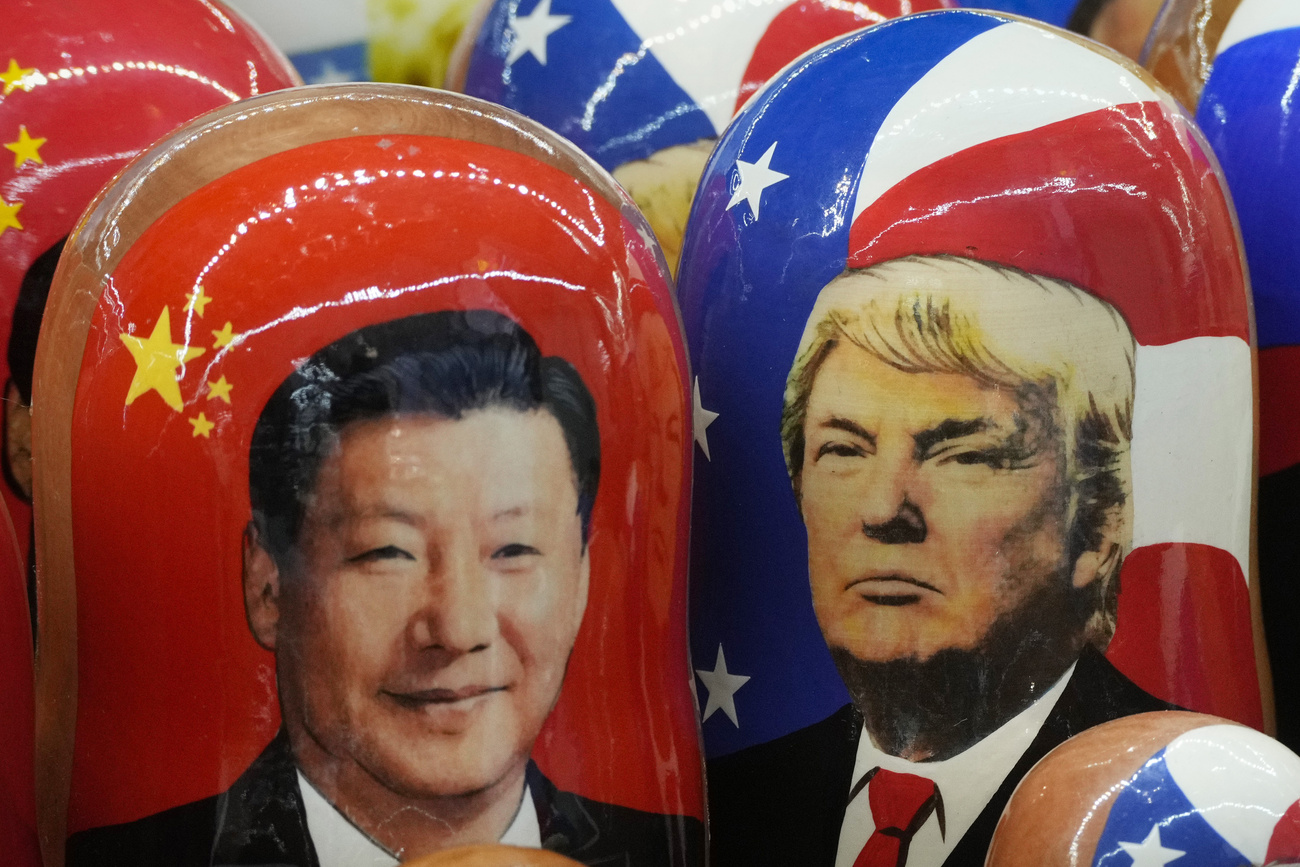
US intervention in Venezuela, the Trump-Xi summit, and nuclear investment

Welcome to our press review of events in the United States. Every Wednesday we look at how the Swiss media have reported and reacted to three major stories in the US – in politics, finance and science.
Would you like to receive the newsletter delivered directly to your inbox? Subscribe here.
The US military’s growing presence near Venezuela and its series of lethal strikes on alleged drug boats have stoked fears that US President Donald Trump could try to topple authoritarian president Nicolás Maduro, who faces criminal charges, including for narcoterrorism, in the US. What’s the Swiss media’s take?
Also this week we consider the significance of the meeting on Thursday between Trump and Chinese President Xi Jinping, and why the US is investing some $80 billion in new nuclear reactors.

“The American president promised to keep the US out of foreign affairs. The military deployment in the Caribbean and the Pacific tells another story,” says the Neue Zürcher Zeitung (NZZ).
The US government’s fight against drug cartels in Latin America has reached a new level of escalation, Swiss public television SRF reported on Friday. The deployment of the world’s largest aircraft carrier group to Latin American waters is the clearest demonstration of power in Latin America to date and goes far beyond all previous missions against drug trafficking, it said.
“Anyone who believed Trump when he promised during the election campaign to keep American soldiers out of foreign conflicts is rubbing their eyes,” the NZZ wrote in an editorial on Wednesday. “The pretext remains the fight against drug trafficking from Venezuela and Colombia. However, the deployment seems oversized for this purpose.”
Could the real reason be regime change in Venezuela? President Nicolás Maduro has repeatedly alleged that the US is hoping to drive him from power.
“What is Trump really planning?” wondered Blick on Tuesday. “For Trump’s supporters, this operation fits perfectly into a well-plotted political scenario. In their eyes, the fall of Maduro would make it possible to stem migration, guarantee America’s oil interests and cement Donald Trump as a charismatic leader.”
But Trump’s tough policy is a dangerous game, Blick warned. “Trump’s gamble could actually backfire: an American attack, perceived as brutal and unjustified, could strengthen Maduro’s position by uniting the Venezuelan population against an external enemy.”
The NZZ said it was “obvious” that Trump continued to have Maduro in his sights – “this time not as an enemy of democracy, but as a drug criminal” – but the military deployment off Venezuela was also a demonstration of power to the whole world. The message, the NZZ concluded, is “if the US wants to, it will move its troops and intervene, no matter where. The world’s policeman is not going away completely after all”.
- News reportExternal link – SRF (German)
- Trump shows his interventionist faceExternal link – NZZ editorial (German, paywall)
- What’s behind Trump’s offensive in VenezuelaExternal link – Blick (French)
- The only war Trump wants to wage is the war for oilExternal link – Blick (French)

US President Donald Trump and Chinese President Xi Jinping are set to meet in South Korea on Thursday. But what Trump will sell as a success is actually a capitulation, writes the Tages-Anzeiger in Zurich.
Traders and investors on both sides of the Pacific are hoping the widely anticipated encounter will ease months of trade tensions. Indeed, as the Tages-Anzeiger noted on Tuesday, both sides have already announced initial concessions: further US tariffs are to be suspended; China intends to resume buying soybeans; and the sale of the American TikTok business also appears to be progressing. “But there’s no real de-escalation in sight. It’s more of a truce – a truce under which both sides are regrouping,” the paper said.
“Donald Trump will portray any agreement, however vague, as a victory. But what’s likely to be reversed are primarily measures that Beijing imposed in response to the tariffs. The US president miscalculated. He apparently believed he could bring China to its knees because of its domestic problems, such as the ongoing housing crisis and weak domestic demand.”
In doing so, the Americans overestimated their own power, the Tages-Anzeiger continued. “Trump’s tariffs are harming China, but also his own country. They are ill-conceived, alienate partners, and weaken allies such as the European Union in competition with China.”
For its part, the Neue Zürcher Zeitung (NZZ) isn’t betting on a lasting détente. It said that by suspending further tariffs, Trump and Xi will have prevented the worst: a further escalation of the trade dispute – “nothing more and nothing less”. “The truce that will likely be reached [in South Korea] would thus remain fragile,” it said.
“It’s a bit like the Cold War between the US and the Soviet Union: Xi has the rare earth elements that the American defence and auto industries desperately need, while the US has the solutions and technologies that China needs to modernise its economy. Each side can turn the tap on or off at any time. Such a balance, like in the Cold War, can prevent escalation – a balance of terror.”
- US has miscalculated in tariff disputeExternal link – Tages-Anzeiger (German, paywall)
- China and the US are likely to reach only a fragile truceExternal link – NZZ (German, paywall)
- Is the customs chaos over? Trump’s Asia trip gives investors hopeExternal link – NZZ (German, paywall)

Washington will invest at least $80 billion (CHF64 billion) in new nuclear reactors through a partnership with the American group Westinghouse.
This is a key step in the revival of American nuclear power, driven by the growing demand for electricity from tech and artificial intelligence (AI) giants, Swiss public broadcaster RTS reported on Tuesday.
The agreement is an extension of an executive order issued by US President Donald Trump at the end of May entitled “Reinvigorating the Nuclear Industry”, in which Trump set a target of ten conventional reactors under construction by 2030.
“This partnership embodies the bold vision of President Trump – to rebuild our energy sovereignty, create high-paying jobs and drive America to the forefront of the nuclear renaissance,” said Secretary of Commerce Howard Lutnick.
The US hasn’t built a nuclear power plant since 2009. The last two reactors commissioned in the US cost over $30 billion, more than double the $14 billion originally planned. But Russia’s invasion of Ukraine has upset the balance of the energy market, prompting governments to diversify their supplies.
Added to this was the acceleration in electricity consumption in the US as a result of the rise of data centres with the revolution in remote cloud computing and AI.
- Donald Trump earmarks $80 billion for new nuclear reactors for AI purposesExternal link – RTS (French)
The next edition of ‘Swiss views of US news’ will be published on Wednesday, November 5. See you then!
If you have any comments or feedback, email english@swissinfo.ch

More
Subscribe to the newsletter “Swiss views of US news”
Stay informed with our weekly newsletter!
Are you looking for a simple way to stay updated on US-related news from a Swiss perspective?
Subscribe to our free weekly newsletter and receive concise summaries of the most important political, financial, and scientific stories in the United States, as reported by Switzerland’s leading media outlets – delivered straight to your inbox.
👉Sign up by entering your email address in the form below!

In compliance with the JTI standards
More: SWI swissinfo.ch certified by the Journalism Trust Initiative
















![The four-metre-long painting "Sonntag der Bergbauern" [Sunday of the Mountain Farmers, 1923-24/26] had to be removed by a crane from the German Chancellery in Berlin for the exhibition in Bern.](https://www.swissinfo.ch/content/wp-content/uploads/sites/13/2025/12/01_Pressebild_KirchnerxKirchner.jpg?ver=a45b19f3)












You can find an overview of ongoing debates with our journalists here . Please join us!
If you want to start a conversation about a topic raised in this article or want to report factual errors, email us at english@swissinfo.ch.